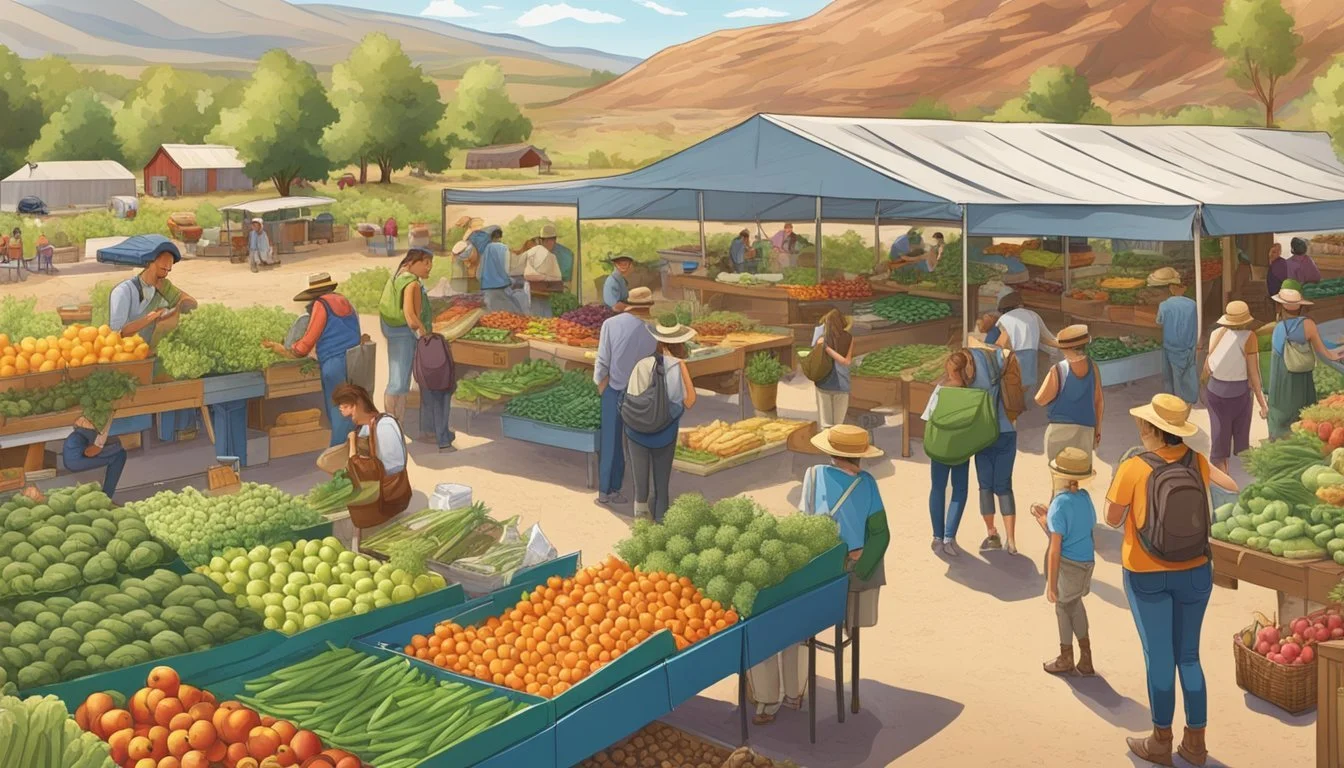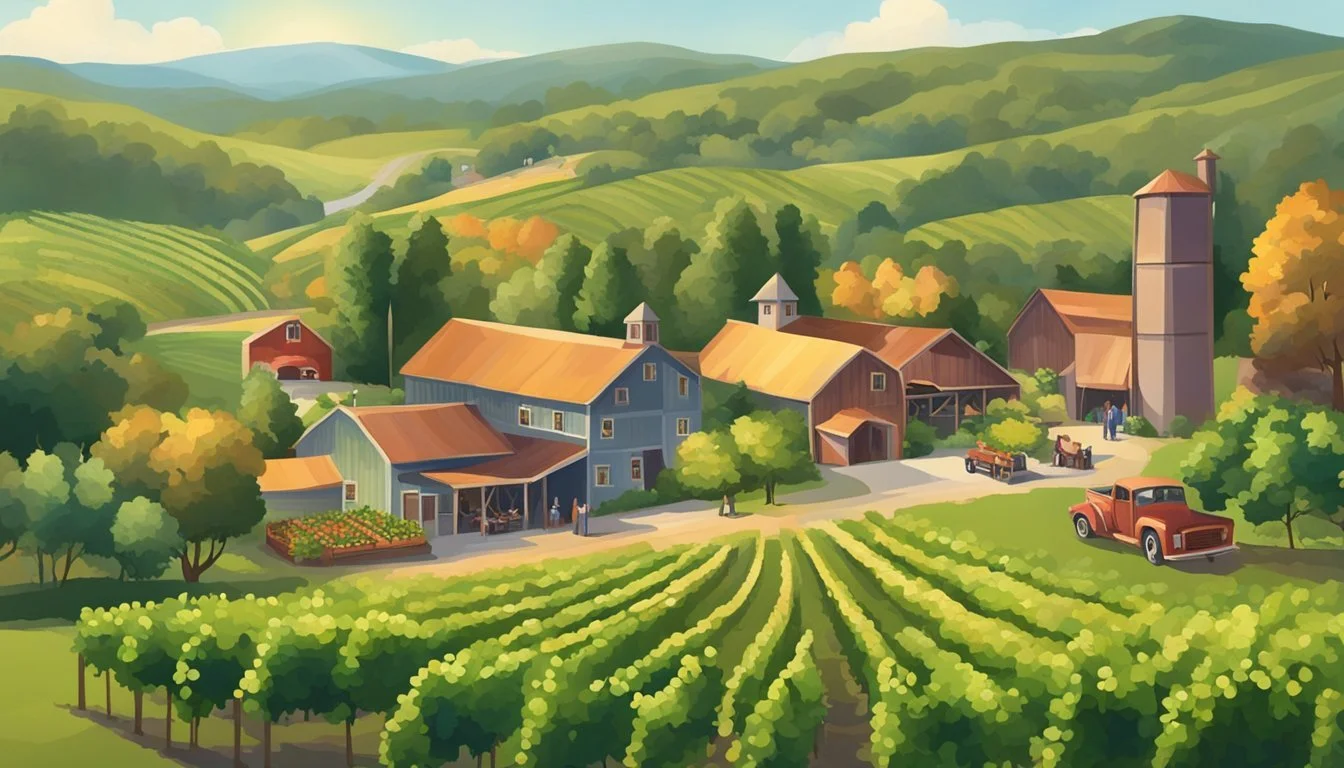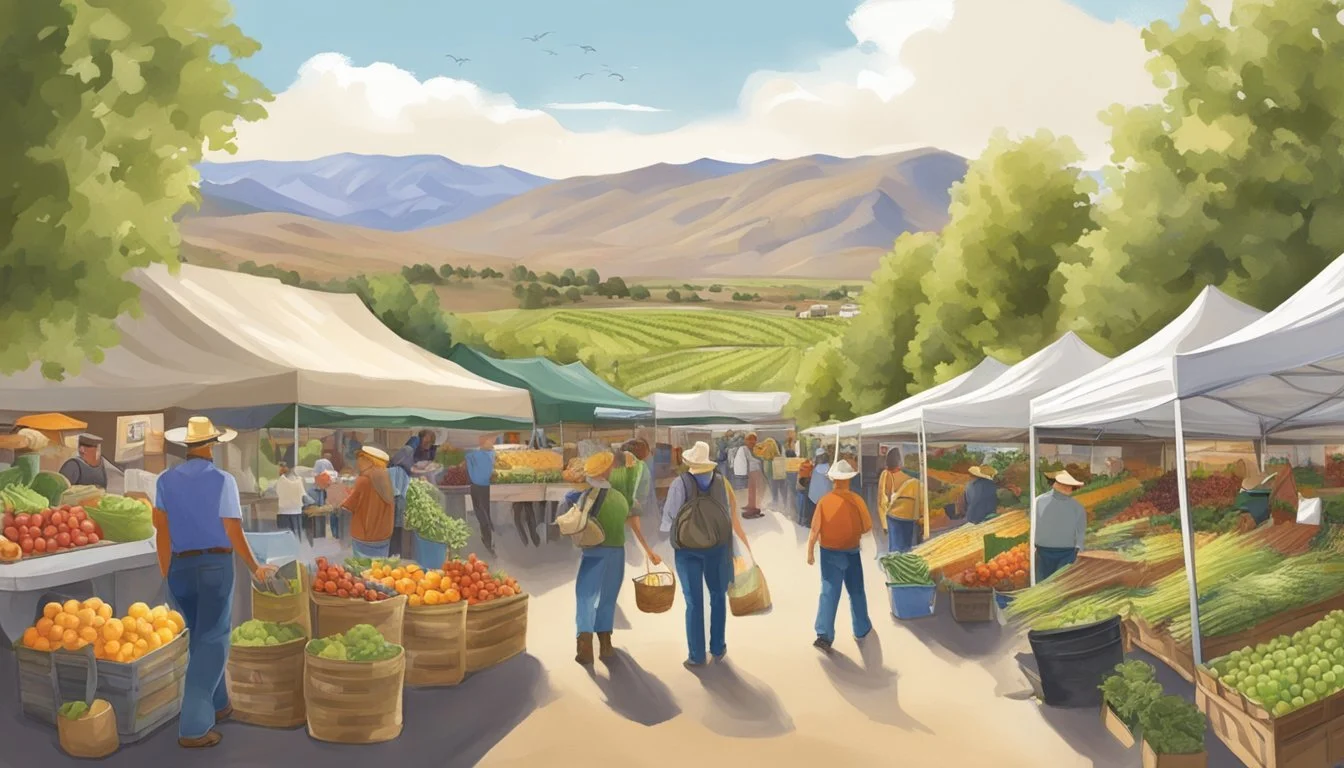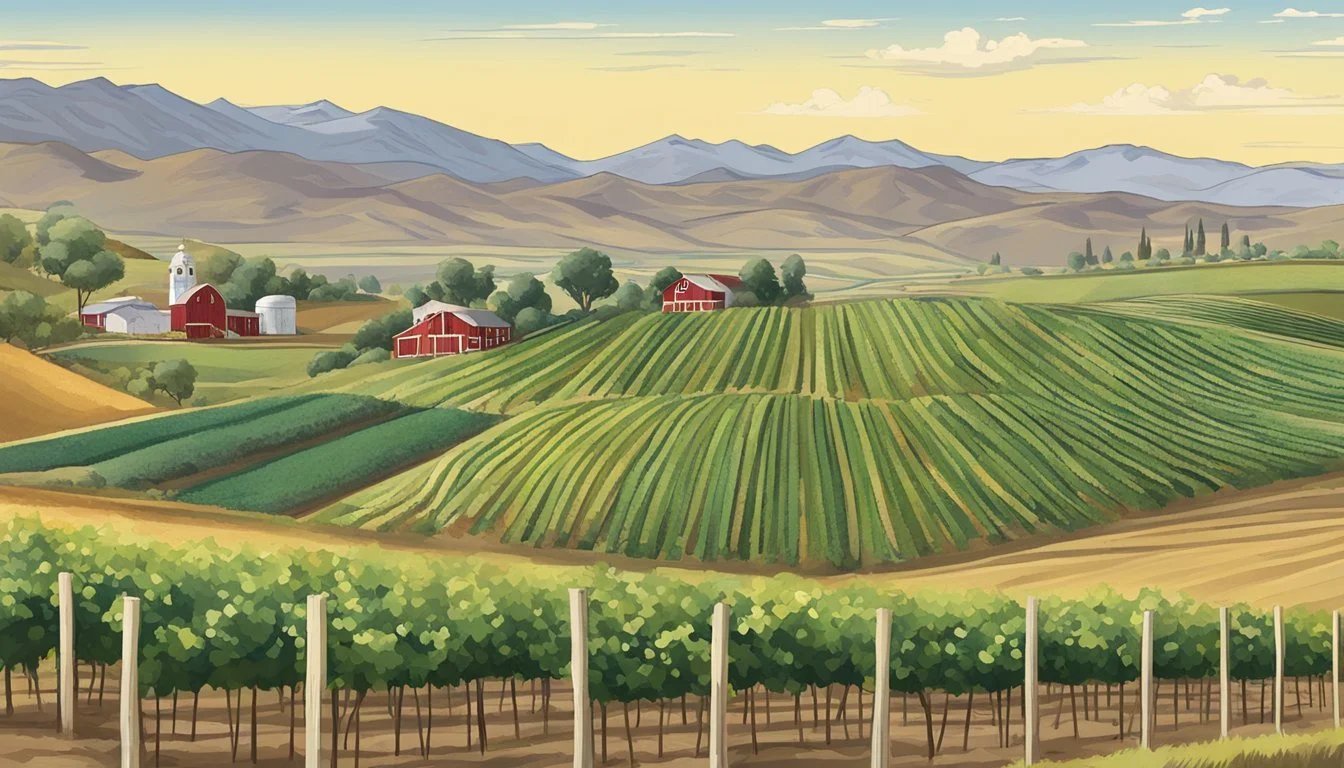Agritourism in Nevada
Embracing Rural Charm and Farming Innovations
Nevada, commonly recognized for the glitz and glamor of Las Vegas, harbors a less flashy yet steadily growing sector: agritourism. This branch of tourism capitalizes on the state's agricultural operations by inviting visitors to engage with the farming life first-hand. Agritourism activities range from educational farm tours to horseback riding, from enjoying the simplicity of petting zoos to the more sophisticated pleasures of wine tasting. For travelers seeking a hands-on experience, Nevada offers an insight into the rustic charm of rural living, while simultaneously providing farmers an avenue to diversify income and foster community economic development.
In the vast expanses of Nevada, agritourism is emerging not only as a leisure activity but also as a potential economic driver for rural communities. The state's large population centers and renowned tourist destinations create a ripe market for these agricultural ventures. By integrating agricultural production with tourism services, Nevada-based operations can tap into the thriving tourism industry, crafting a unique blend of experiences that highlight both the state's productive capabilities and its natural beauty.
The concept of agritourism in Nevada is taking root in places like the Vegas Roots Community Garden, which transforms vacant urban land into verdant agricultural plots open for public engagement. These community-based initiatives underscore the symbiotic relationship between urban and rural spaces. They also amplify the message that agritourism isn't just about the entertainment value but also about educational exchanges, promoting sustainable practices, and fostering a deeper appreciation for the origin of food and the labor that brings it to tables across the state and beyond.
The Rise of Agritourism in Nevada
In Nevada, the expansion of agritourism reflects a growing interest in rural experiences and contributes to the state's diverse tourism portfolio.
Definition and Scope
Agritourism in Nevada encompasses a range of activities that merge agricultural operations with tourism. These activities provide visitors with an immersive experience of the rural lifestyle and agricultural practices. They typically include farm visits, u-pick operations, ranch stays, educational tours, and the celebration of local food and culture.
History and Development
The gentle ascent of agritourism in Nevada began as ranchers and farmers sought to diversify income streams. Historically reliant on traditional farming and ranching, Nevada's rural communities have embraced tourism as a means to enhance the local economy. The industry has seen modest financial input initially, with farm-related recreational services previously contributing $442,000. This indicates the industry's nascent stage but also highlights the significant opportunities for growth within the national context of agritourism.
Agricultural Background of Nevada
Nevada's agricultural sector is diverse, comprising both crop production and livestock farming, which vary significantly across regions due to the state's differing climates and geographies.
Prominent Crops and Livestock
Agriculture in Nevada features a combination of crop production and livestock farming.
Crop Production:
Vegetables: The state grows a variety of vegetables, with an emphasis on crops that can tolerate the arid climate.
Fruits: Fruit farming occurs, but on a smaller scale due to climate limitations.
Livestock Farming:
Cattle and Calves: The backbone of Nevada's livestock industry.
Sheep and Lambs: A significant part of the livestock sector, predominantly raised in the northern regions.
Dairy: Dairy farms are found throughout Nevada, with larger operations predominantly in the south.
Regional Agricultural Differences
Nevada's agriculture is shaped by its geography, which creates distinct regional differences.
Northern Nevada:
Larger cattle and sheep ranches are located in the north.
The climate is more conducive to these livestock due to cooler temperatures and more available grazing land.
Southern Nevada:
Hosts the state's largest dairy operations.
High temperatures and drier conditions make it less suitable for crop production without significant irrigation.
In summary, Nevada's agricultural sector is well-adapted to its specific regional climates and geographies, focusing on livestock like cattle, sheep, and dairy, with crop production that includes a variety of vegetables and some fruits.
Agritourism Attractions and Activities
Nevada offers a diverse array of agritourism attractions and activities that cater to various interests from educational farm tours to recreational pursuits and seasonal festivities.
Farm Tours and Experiences
Agritourism in Nevada thrives with a multitude of farm tours and experiences. Visitors can explore Vegas Roots Community Garden in Las Vegas, spanning over 4 acres that embody urban farming. Educational demonstrations are commonplace, offering insights into sustainable farming practices. Many farms also provide hands-on activities, like pony rides and petting zoos, adding delight for younger guests.
Seasonal Events and Festivals
Seasonal events and festivals are highlights in Nevada's agritourism calendar. The Fallon Cantaloupe (how long does cantaloupe last?) Festival celebrates the region's farming heritage, featuring the luscious Fallon cantaloupes. Visitors can also enjoy the Lavender and Honey Festival, which showcases the fragrant and flavorful contributions of local agriculture. In Reno, the Garlic Fest allows participants to savor the pungent bulb, central to both cuisine and culture.
Recreational Opportunities
Agritourism isn't just about the food; it's also about the recreational opportunities it presents. Horseback riding through the picturesque landscapes offers a unique chance to experience Nevada's natural beauty. The autumn season sees an influx of visitors to pumpkin patches and corn mazes. For the more adventurous, there are opportunities for hunting, which are regulated to ensure conservation and sustainable practices.
Economic Impact and Opportunities for Nevada
Agritourism in Nevada is emerging as a significant contributor to the local economy, providing diversified income streams for farmers and expanding job opportunities in rural areas.
Agritourism's Role in Local Economy
Agritourism has carved out a niche within Nevada's broader tourism industry. It offers rural counties a robust avenue for economic development. Compared to the neon allure of Las Vegas, agritourism invites visitors to a different Nevada experience, one that uplifts the agricultural backbone of the state. As of the early 2000s, the income from agritourism was modest, but recent trends indicate growth in this sector. The influx of visitors not only injects direct revenue into farm enterprises through activities such as farm stays, harvest festivals, and guided tours, but also stimulates ancillary spending in local communities on lodging, dining, and shopping.
Direct Revenue: Income from on-farm agritourism activities.
Ancillary Spending: Visitor expenditures in surrounding local businesses.
Opportunities for Farmers and Ranchers
Nevada's farmers and ranchers can leverage agritourism for both financial stability and market expansion. By diversifying their income sources, they can reduce the risks associated with conventional agriculture, such as market volatility and dependency on crop yields. Furthermore, engaging directly with a learning-motivated public through agritourism provides an excellent opportunity for marketing. This interaction builds customer relations and educates consumers about the state's agricultural processes, enhancing the overall value of the Nevada brand in markets.
Income Diversification: Incorporating tourism-related activities to stabilize farm income.
Customer Education: Using agritourism as a platform for direct marketing and consumer engagement.
By interlacing agricultural heritage with tourism, Nevada can cultivate a symbiotic relationship that benefits both the farming community and the statewide economy.
Key Locations for Agritourism in Nevada
Nevada offers a rich tapestry of agritourism experiences, from the serenity of Northern Nevada's working farms to the vibrant community gardens of Las Vegas in the south.
Northern Nevada Agritourism
Reno and its surroundings, sometimes known as the "Silver State," present visitors with a variety of agritourism opportunities. Lattin Farms, located near Fallon, is a staple of the region, offering fresh produce and a chance to experience farm life. Visitors can also enjoy the local farmers markets where they can directly support the community's agricultural producers.
Close to Carson City, Churchill Vineyards is nestled in the heartland of Nevada’s agricultural community. It's one of the few places where visitors can taste and appreciate local Nevada wines. The Stillwater Wildlife Refuge, significant for its birdwatching opportunities, is also a location where agriculture and nature tourism intersect, giving visitors a unique way to experience the region's natural beauty.
Southern Nevada Agritourism
Las Vegas, known for its bright lights and bustling urban life, also features the Vegas Roots Community Garden, a green oasis offering an agritourism experience right in the downtown area. Beyond the city, visitors can find agritourism ventures that showcase the diverse agricultural practices adapted to arid climates.
For those interested in farm-to-table experiences, the city of Henderson and surrounding areas, including Winnemucca, host farmers markets where local produce is celebrated and sold. These markets not only provide fresh goods but also foster a connection between consumers and farmers, highlighting the importance of agriculture in the region.
Challenges and Considerations
When venturing into agritourism in Nevada, operators must navigate a landscape marked by environmental constraints, economic and marketing hurdles, and various legal and regulatory requirements which are essential for sustainable and profitable operations.
Environmental Concerns
Environmental challenges in Nevada's agritourism relate predominantly to water use and management. The arid climate necessitates strategic water conservation, and agritourism businesses must implement:
Efficient irrigation approaches that reduce water consumption without compromising crop quality.
Sustainable practices such as xeriscaping and rainwater harvesting to maintain attractive landscapes with minimal water use.
Economic and Marketing Challenges
Agritourism entities must often overcome significant economic challenges, including financing and tax planning. A strategic approach to these economic aspects includes:
Securing financing with favorable terms to invest in necessary technology in agriculture that can enhance visitor experience and operational efficiency.
Tax planning to leverage agritourism’s potential tax benefits and navigate the specific taxation nuances related to agricultural enterprises.
Marketing remains a pivotal factor for these businesses. It's critical to:
Develop a robust marketing strategy that accurately targets and reaches potential visitors.
Utilize social media and online platforms for marketing to capitalize on the growing technology trend in tourism.
Legal and Regulatory Factors
Legal and regulatory considerations encompass a range of issues that agritourism businesses must address:
Liability concerns are paramount, as agritourism can expose operators to a variety of risks. Adequate insurance and well-crafted liability waivers are essential.
Compliance with regulatory requirements at both local and state levels, including health and safety standards, is vital for legal operation.
Regulatory factors are not only about compliance but also ensuring that the quality of service provided to visitors meets legal expectations.
Planning Your Agritourism Experience
In Nevada, planning an agritourism experience can offer visitors a unique blend of education, entertainment, and authentic rural life. Here are some specific ways to immerse oneself in the local farm and food culture.
Visiting Farms and Ranches
Farms and ranches in Nevada open their doors to visitors for tours that often include a variety of hands-on activities. It’s advisable to schedule your visit during the farming seasons when you can participate in harvesting, learn about sustainable farming practices, or enjoy a farm-to-plate meal. Vegas Roots Community Garden in Las Vegas is an example where guests can engage with urban agriculture on over 4 acres of land.
Types of Tours:
Guided tours
Self-guided tours
Harvesting experiences
Participating in Agritourism Events
Nevada hosts numerous agritourism events, including food festivals and farmers' markets where visitors can taste local produce and specialty foods. These events may also include workshops and programs on agriculture-related topics. For instance, visitors might attend a festival celebrating local cuisine, or participate in a Community Supported Agriculture (CSA) program that supports local farmers and provides fresh produce to the community.
Events to Look For:
Seasonal harvest festivals
Cooking demonstrations
Agricultural workshops
Engaging with Local Communities
Interaction with local communities is a centerpiece of the agritourism experience in Nevada. Visitors often find that engaging with the residents and learning about the rural lifestyle enriches their visit significantly. Rural counties in Nevada offer opportunities for tourism that can contribute to community economic development, creating meaningful connections between visitors and hosts.
Community Engagement Tips:
Stay at a local bed and breakfast
Engage with farm owners and staff
Explore local artisan products
Each of these opportunities presents a unique way to experience the diversity of agritourism in Nevada, blending tourism with authentic agricultural learning and enjoyment.
Marketing Strategies for Agritourism Ventures
Agritourism ventures in Nevada can optimize their growth by leveraging distinct marketing strategies that combine online sophistication with traditional engagement methods.
Online Presence and Digital Marketing
An agritourism business must establish a robust online presence to reach a broad audience. Strategies include Search Engine Optimization (SEO) to improve visibility in search results and the use of social media platforms to engage with potential customers by sharing engaging content about farm experiences, seasonal events, and customer testimonials. Responsive website designs and email marketing campaigns are instrumental in providing up-to-date information about offerings and activities.
Community Engagement and Networking
Local communities form the backbone of successful agritourism. Ventures should focus on networking within local business circuits, attending and presenting at community events, and building relationships with tourism boards. Partnerships with local businesses can be promoted through mutually beneficial promotions, while distributing brochures in high-traffic areas can increase local footfall.
Harnessing Word-of-Mouth
Word-of-mouth remains a powerful tool. Agritourism operators should encourage visitors to share their experiences through online reviews and social media shares. Offering incentives for referrals and repeat visits can also catalyze word-of-mouth promotion. Personal stories shared online can resonate well with potential customers, especially when they highlight unique aspects of the Nevada agritourism experience.
Future of Agritourism in Nevada
Agritourism in Nevada stands at the cusp of transformation, with technology and emerging markets driving advancement and diversification in the sector. The future trajectory indicates a blend of innovation and development, tapping into new opportunities for growth.
Innovations in Agriculture
Technology in agriculture is paving the way for Nevada's agritourism. With the integration of precision farming techniques and the deployment of hoop houses, farmers can extend growing seasons and enhance productivity. This innovation not only promotes year-round tourism but also supports the diversification of produce offered to visitors. For instance, hemp production has seen an increase, propelled by recent regulatory changes, positioning Nevada to capitalize on this lucrative crop. The versatility of hemp and its growing market could attract a niche audience interested in sustainable agriculture and plant-based products.
Emerging Markets and Trends
The emergent market trends within Nevada's agritourism scene highlight an interest in authentic, rural experiences. Tourists show a growing preference for interactive activities such as farm stays, hands-on workshops, and culinary events that focus on local produce. Nevada's farms are gradually shifting to accommodate these trends, recognizing the value in offering distinctive experiences that combine agricultural education with recreation.
The rise in demand for new crops and organic produce is leading to opportunities for Nevada's farmers to expand their offerings and appeal to health-conscious consumers. Coupling this with the scenic beauty of Nevada's rural landscapes sets a promising future for the state's agritourism. As operators connect with vibrant markets and adapt to consumer preferences, the state's agricultural scene is poised to flourish, making agritourism an increasingly significant component of Nevada's rural economy.
Resources for Agritourism Development
For those looking to develop agritourism in Nevada, resources are abundant, from educational programs that enhance learning to various funding opportunities that can help kick-start or expand agritourism ventures.
Educational Programs and Workshops
Educational resources play a critical role in agritourism development. Farmers and ranchers can benefit from a variety of programs that teach agritourism best practices and emerging trends. The University of Nevada, Reno often conducts workshops and seminars aimed at educating agricultural professionals about the potential and operation of agritourism.
Nevada Farms Conference: This annual event provides agriculturalists with valuable insights into agritourism through specialized sessions and networking opportunities with peers and experts.
Extension Services: Offer ongoing educational resources and may host events focused on agritourism development.
Funding and Grants
Funding opportunities in Nevada assist farmers and ranchers in initiating or expanding their agritourism operations. Grants can provide the necessary financial support for developing facilities, marketing agritourism experiences, or enhancing visitor services.
Grant Opportunities: State and federal programs are available – it is advisable for prospective recipients to regularly check for relevant grant announcements.
Source Type of Funding Nevada Department of Agriculture Grants for agricultural development USDA Rural Development Federal grants and loans
Farmers and ranchers looking to diversify through agritourism can utilize these resources to build robust experiences that attract visitors while preserving Nevada's agricultural heritage.
Conclusion
Agritourism represents a significant opportunity for Nevada's economy, particularly in rural areas. Its integration into existing agricultural businesses allows for diversification and the potential to tap into the state's strong tourism industry. Visitors are offered unique experiences such as farm tours, pick-your-own produce, and seasonal activities like corn mazes and pumpkin patches.
Economic Benefits:
Expansion of farm income: Agritourism provides an additional revenue stream.
Risk reduction: It decreases reliance on traditional farming alone.
Community impact: Local economies benefit from the visitor spending ripple effect.
Educational and Cultural Contributions:
Visitors engage in learning about agricultural processes.
They gain an appreciation for rural heritage.
Nevada's proximity to large population centers and established tourist destinations like Las Vegas creates a robust market for agritourism businesses. Moreover, initiatives like the Vegas Roots Community Garden illustrate successful urban agritourism models that connect visitors with agriculture in unexpected settings.
In conclusion, agritourism in Nevada is poised for growth, offering economic, educational, and cultural advantages to the state, its farmers, and its communities while enhancing the tourism sector with rich, interactive experiences. The continuing development of this segment promises a more resilient and diverse agricultural economic landscape in Nevada.











